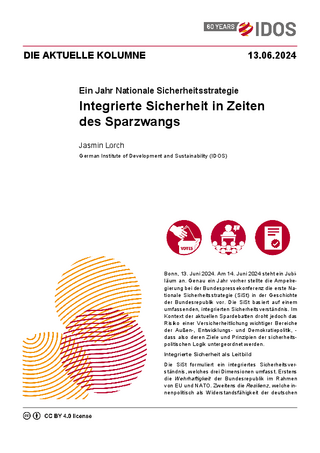One year of the German National Security Strategy
Integrated Security in Times of Austerity
Lorch, JasminThe Current Column (2024)
Bonn: German Institute of Development and Sustainability (IDOS), The Current Column of 13 June 2024
Bonn, June 17, 2024. 14 June 2024 was an anniversary. Exactly one year before, the “traffic light coalition” government of the Federal Republic of Germany, at the Federal Press Conference, announced the first National Security Strategy (SiSt) in the country’s history. The SiSt is based on a comprehensive, integrated understanding of security. In the context of the country’s current austerity debates, however, there is a risk that important areas of foreign, development and democracy policy will become securitized, meaning that their goals and principles might become subordinated to a security logic.
Integrated Security as Guiding Principle
The SiSt formulates an integrated understanding of security that encompasses three dimensions. First, robustness, which is mainly defined as the ability of the Federal Republic of Germany to defend itself and its allies within the framework of the EU and NATO. Second, resilience, which in terms of domestic politics is understood as the resilience of German democracy against attacks from both within and abroad, and as prosperity and economic resilience within Germany. And third, sustainability, defined as safeguarding natural resources as the foundation of life.
Lack of Strategic Clarity in the Context of Austerity Debates
However, the document lacks strategic clarity, and it contains numerous conflicting objectives for which the German government has hardly defined any solutions and priorities as yet. Accordingly, the SiSt also leaves it largely unclear which instruments and resources should be used and how to achieve which goals. At the same time, the government has pledged to achieve the implementation of the SiSt without putting additional burdens on the federal budget, a commitment explicitly formulated in the strategy itself. This makes cutbacks in certain areas in favor of others unavoidable. The only concrete financial commitments formulated by the SiSt relate to the goal of prospectively spending two percent of the gross domestic product on defense, as well as to the 100 billion Euro “special fund” for the Federal Armed Forces (the Bundeswehr), which has almost been used up by now.
The German National Security Strategy lacks strategic clarity, and it contains numerous conflicting objectives for which the German government has hardly defined any solutions and priorities as yet.
The current budget debates run counter to the SiSt’s integrated understanding of security in many respects. The Minister of Finance has requested all ministries to save money in 2025, the only exception being the Federal Ministry of Defense (BMVg). According to media reports, the Federal Foreign Office (AA) might only have 5.1 billion Euro at its disposal for 2025, as opposed to 6.7 billion in the current year, which could mean that humanitarian aid might be cut by around 50%. The budget of the Federal Ministry for Economic Cooperation and Development (BMZ) was cut from around 12.16 billion to 11.52 billion in 2024 and might fall to around 10 billion in 2025. The Federal Ministry of the Interior and Community (BMI) is expected to save around 1.2 billion. This could, for example, be realized at the expense of measures to combat disinformation. In 2023, the BMI had considered cuts to political education.
Risk of Securitization
The SiSt does not define any concrete measurable and verifiable objectives for central areas of foreign and development policy, as well as for the protection of democracy in Germany. Consequently, there is a risk that these policy areas will be subordinated to the objectives of security and defense policy when the envisaged austerity measures are implemented. For instance, the German government has stated in the SiSt that it will promote the expansion of Germany’s security and migration partnerships. It also wants to diversify Germany’s supply chains for energy and strategically important raw materials by establishing new trade partnerships. As a result, there is a risk that increasingly scarce funds for humanitarian aid and development cooperation will in future flow primarily to countries, which the German government considers as important security and trade partners, while other criteria, such as the needs of these countries or whether they are democracies or autocracies, could continue to lose importance.
However, the SiSt itself states that Germany’s security is “linked to the security and stability of other regions in the world”. Accordingly, hunger, conflicts and autocratization trends elsewhere can also affect the security of Europe. At home, political education and measures to combat disinformation are indispensable for strengthening the resilience of Germany’s liberal democratic order. The preservation of social peace, which the SiSt also defines as an important objective, requires that the state mitigates the costs of the country’s energy transition, external shocks and the impacts of technological change for vulnerable
groups in Germany.
Ignoring these interrelations would, in fact, contradict the integrated understanding of security advanced by the SiSt.
In the current budget debates, the federal government and the Federal Parliament (the Bundestag), should consider the SiSt’s integrated understanding of security and identify ways to enable its realization. It would also be important that the relevant ministries identify and negotiate priorities on the basis of the SiSt and back them up with both measurable indicators and resources.


